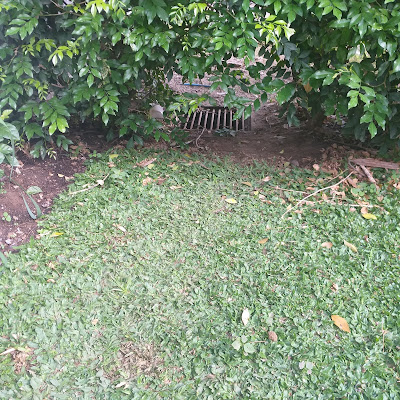AND one day, I could not find even one puppy in the garden. I wondered if all four rascals had somehow slipped through the gate when I heard faint barking from the other unit in the duplex.
Our next-door neighbor works overseas. We have seen her once when she briefly returned for a relative’s wedding. The house is permanently locked but the garden has grown unchecked.
Except for other neighbors sometimes helping themselves to the lemoncito and papaya the owner invites everyone to pick, only cats disappear into the disarray, perhaps hunting for birds’ and mice nests.
Until the K-pups discovered the other garden. The rainwater drain between our property and our neighbor’s leaves enough space in the “kamuning” bushes we planted as border between the properties for a seven inch-high creature to saunter through.
In their little savage hearts, there is no contest between our garden and the other place, so wild, shocking, sublime for mayhem and monkey business.
Examining the trophies of tangled-up roots and chewed-up twigs they bring back to our side, I am awed by the ease with which the K-pups easily pass in and out of these two spaces: the ordered, predictable, and humdrum world we imagine as a garden, and the insane, unbounded, and unpredictable Eden the puppies freely convert into what they want it to be at the moment.
Weeks of lockdown have made me realize how much of what constitutes my life is non-essential. Shedding these off—the material, the intangible—has not changed me.
The more difficult task is to invade spaces not imagined. What I cannot imagine, I cannot explore.
The mark of civilization is after all closed eyes, the ability to not just walk in the dark with eyes closed but to have the aptitude to convert the dark into the black-and-white patterns of the unknown and the known governing the way we divine and interpret our life.
In our myths, heroes and heroines journey to bring back the same fruit from the quest: a mystery reduced to a news story. Why should we not invert the happy ending: at the end of the mystery is even a greater one? Then the heroine can go off for more adventures. No retirement; no fading away.
What philosophers think of as the gaze are hoods, blinders, masks that shutter our eyes.
I suspect the K-pups suffer from no such malady. That curiosity, blessed savagery coalesce the known and the unknown into just one quality: the knowable. While rude appetites mark one territory as habitat and food and the other, as playground, their imaginations never fail as their eyes, nose, ears, paws.
Dogs do not divine, unlike humans. One lives; the other rehearses.
Limen. Under the kamuning, Silang, Cavite, 25 April 2020
(mayette.tabada@gmail.com/ 09173226131)
*First published in SunStar Cebu’s April 26, 2020 issue of the Sunday editorial-page column, “Matamata”



